Hannaleena Hauru: “Ridiculous can also be erotic”
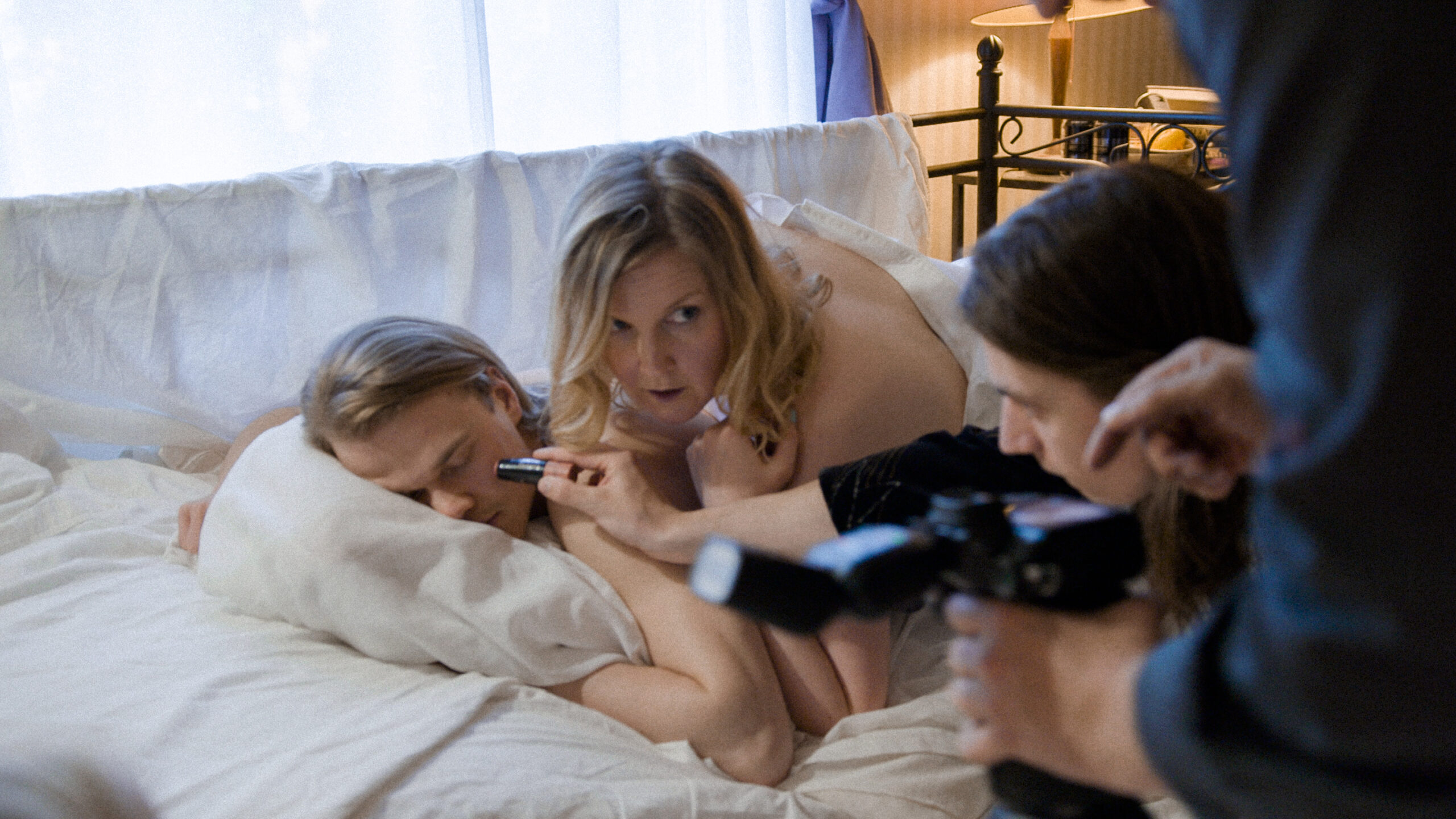
By Marta Bałaga
Finnish director, now showing her new film Fucking with Nobody at the Biennale College in Venice, is ready for another chapter.
Marta Bałaga: After watching your films, I feel like I spent the whole day inside of your head: there are rabbits, kittens and feminists. But also people who can’t express their emotions?
Hannaleena Hauru: I would say this is the very essence of why I became a filmmaker [laughter]. For me, the language of cinema very much tangoes with this issue, or all the issues I can’t put into words myself. Even though I was always one of these kids who has been writing ever since they learnt how to write.
In your short If I Fall [about a young sawmill worker] there is a scene where this very introverted woman, instead of telling her co-worker how she feels, gently pushes their cups together. Where does this awkwardness come from?
During this last week I have been talking a lot about this issue. Mostly because now I have friends who are in their 20s. When we were making Fucking with Nobody, I was just so impressed by their skills. I still am impressed by how they can verbalise their emotions or feelings. For people who were born in the 1990s and even later it comes naturally. My generation wasn’t like that at all. We all struggled with emotions. I guess I am trying to learn from them now.
For me, even the Spice Girls and this idea that women can misbehave was quite revolutionary. But so many of your characters don’t want to be perfect. They don’t want to be like students from the Scandinavian Geisha School in your feature debut [2017’s Thick Lashes of Lauri Mäntyvaara].
It’s funny that you mention Spice Girls, because my favourite Spice Girl was Geri Halliwell. I was maybe 13 years old at the time and I was embarrassed to admit it. I was lying that “no, she isn’t, what are you talking about”. I thought that my friends would immediately see me as “slutty”. It’s weird to think about it now, even though they were all about the “girl power”. It has been a long, long way to even be able to write something like that, or create a female character that pees in public in Fucking with Nobody. Before, I was too embarrassed to even think like that.
With Thick Lashes, that film had a lot to do with my teenage years and my friends’ teenage years. I was going back to my old diaries when I was making it, having discussions with my childhood friends. It was an interesting process, although it feels like it was so long ago!
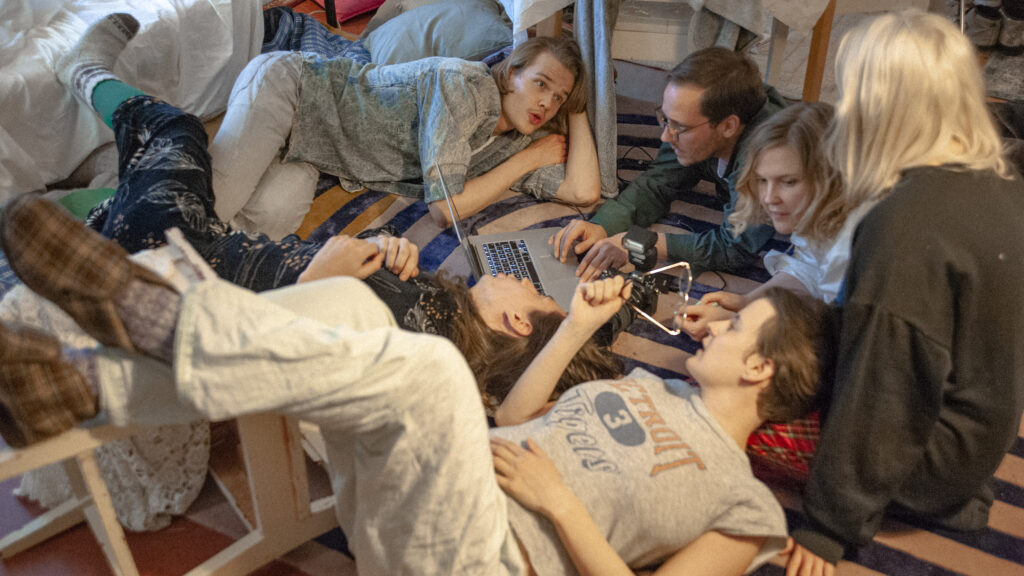
Girls in that film were sabotaging weddings, but there is a sense of merry anarchy in many of your films: mayhem ensues and the extras go crazy. Why do you like it so much?
If I have one mission in cinema, I would say that I really want to refresh it. But if you want to defuse a bomb, you have to know which strings to pull. It may come from the fact that I deal with relationships a lot in my films, and it has become clear that we have to renew these existing storylines. So to say something about what I am experiencing in my own life, or what I see around me, I need a different way. If I would try to squeeze it into classical narration, it just wouldn’t fit. Here it is: I want to find new ways of sharing stories. Or at least deconstruct what we already know.
With Fucking with Nobody, it was our colour grader who said: “This film is really destroying itself towards the end.” I just thought it was beautifully expressed. When it comes to the origins of that story, first of all, every film I have ever done was always supposed to be a short. The starting point was about being in love: loving somebody or receiving their love. Soon after that, I realised that it needs to be more of a performance or an installation.
With [co-writer and co-actor] Lasse Poser, we are friends and we have already been working together, so we decided to write it together. “Let’s have some kind of a dialogue” – we thought. I wanted to get as close to my personal limits as possible. It’s an artistic mission of sorts and something I recognise in my works: many times my actors have been my alter egos. In Thick Lashes, in If I Fall, in many other shorts. It’s something I recognise in the work of my colleagues as well. So many times a screenwriter writes herself or himself into the story. It was bothering me in my own work, so I decided I have to face this challenge and do my own dirty work this time. I had a rare opportunity to deal with real emotions, even though it’s a work of fiction.
With Lasse, we have known each other for 15 years, so we just felt safe with each other. It was about not being afraid of my “dark side”. The film had to deal with fantasies and nightmares, so I could also explore my own.
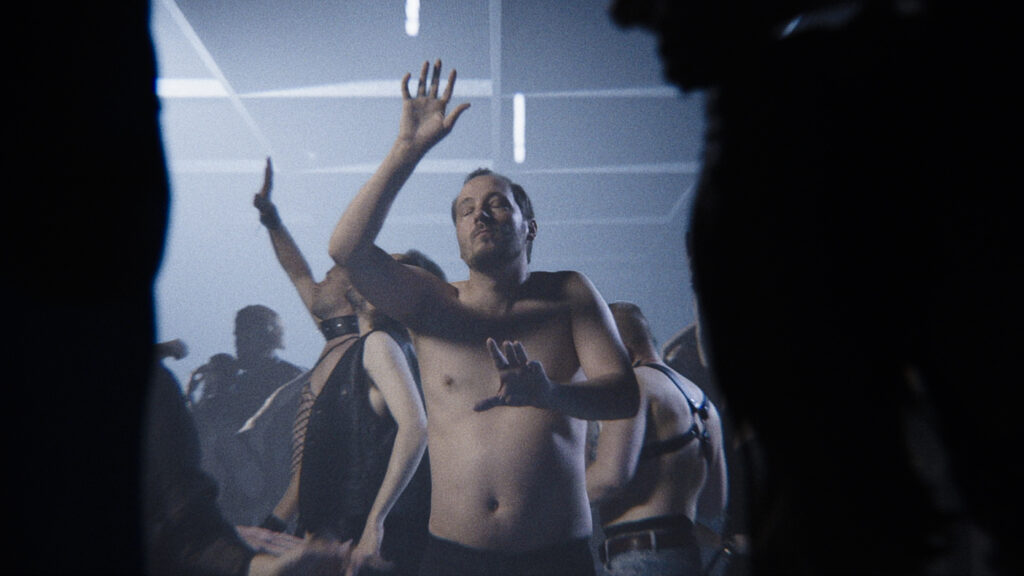
On social media, which is also a focus here, it’s more about the pretty side.
I was editing the film myself and it was hard to watch this character being unfair and aggressive. It’s “my” character, and yet she can be so mean, even ruthless! It’s a funny feeling. I though about how women are portrayed in films, what is considered beautiful. Every actor decided what is their own limit, how personal they are willing to go. How much of their own experience they want to use. As a director, the only thing I was moderating was asking everyone, every once in a while: “Are you ok? Are you fine with sharing all that?”
The idea of having a boyfriend as a social currency… I remember it being very much the case when I was younger or still in school.
It’s not something I have personally experienced, but it happens. I remember a friend of mine who realised that her social standing, at least in the workplace, really changed after she started to be in a stable relationship after being single for a very long time. Even though she didn’t have a “trophy husband”! So yes, it has been borrowed from the contemporary Finnish workplace, although of course it didn’t reach quite the same extent.
Regarding social media, I would say I am a digital native, but not a heavy user of Instagram for example. But now that the film has been shown to some viewers, people start opening up to me about these things. “You know, I have friends who are a couple and they are always posting this and that.” People are telling me about their frustrations! So yes, it still exists.
Maybe it’s just, again, a generational thing, as I don’t really see it happen among my friends, at least the ones who are almost 40 years old. We still have a lot of work to do to really understand that social media is not real. It’s just a showcase of our lives, our relationships.
When you show people’s fantasies, like in Thick Lashes or now, giving them a proper retro makeover, how do you want to show desire? It can be funny in your films.
I think that also in this new film, with that “VHS fantasy” these characters have, it’s just something that’s always on my agenda. Also to portray female sexuality as something that can be really fun and hilarious. It’s also how I feel about sexuality – I want it to be fun. Maybe it’s a commentary of some kind, because when I think about European arthouse films, very often it’s really not the case. It’s serious, while I tend to think that the ridiculous can also be erotic.
Now I am starting to understand why you like A Fish Called Wanda so much, with Jamie Lee Curtis losing her mind whenever someone speaks in a foreign language. But in Mercy All the Way you also showed sex being used as a weapon!
A Fish Called Wanda was on TV the other day and of course I watched it again. As a kid, I watched it all the time. But now, I was really impressed by the brilliance of all these actors for example. It’s beautiful to watch.
The original idea for Mercy All the Way came from me and from [actress] Tanja Heinänen, who is also in Fucking with Nobody and has acted in many of my films. We had some red wine, and then there was this news article by Markus Määttänen. He wrote a column, claiming that if Anders Breivik and Finnish school shooter [Pekka-Eric Auvinen] had girlfriends, and sex, they probably wouldn’t have killed anyone. We started to talk about it and we saw some humour in it. “You know, there could be a film where women actually give sex to lonely young men and have this secret club.” It was on our mind for three years, this fun satire, and then it became a script. It was about figuring out how to talk about this issue and then twist it around. It was just one of these ideas you have after having some red wine in the evening.
In its own way, it’s very logical thinking. Our own happy ending was also that Markus came to the premiere of our short. He took it so well, was very professional and then publicly said it’s a very good and funny film [laughter].
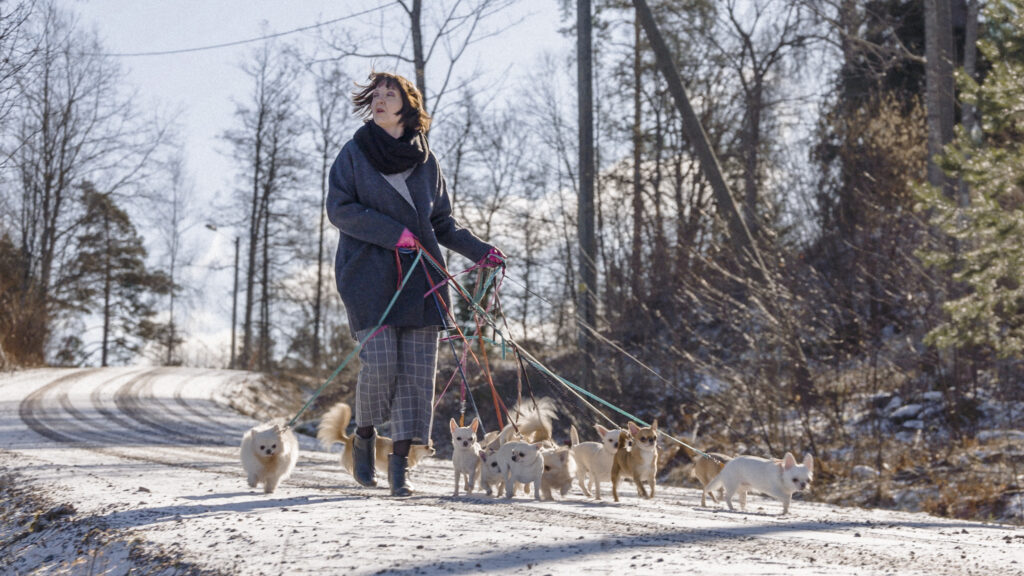
I was just about to ask – how did this collaboration with Tanja even begin? Your first film together was all the way back in 2007.
We met in a student theatre in Tampere – I was a fan of her acting. We weren’t really friends, just members of the same theatre group. And then, when I was making If I Fall, I basically asked: “Would you play the lead role?” Through making this film, we slowly became friends. She has a Masters in screenwriting, so she is an actress who is very dramaturgy-oriented. That’s something that also helped us grow and work together I guess.
As you said, she is in the new film as well, just like the good part of the Finnish film industry, with recognisable faces showing up in the background. But there is also a conversation about having to choose between making films to “finance your new sailboat” or doing, well, the exact opposite.
In this scene, I think I am both. I am [the main character, played by Hauru] Hanna and her enemy Kristian, because if I think about my professional career, I am always juggling the two. I direct TV to pay the bills, and then I have six months when I can focus only on my stuff. I don’t sail, so I don’t need to buy a boat, but I have done projects not just out of ambition or to grow as an artist. Just to pay my rent.
I really feel that I have to very careful about it though. What I notice, and I find sad, not just when it comes to my colleagues but also with sports for example, is that your muscles get used to a certain movement. I would be afraid to direct TV series for a couple of years, afraid I would get used to certain mannerisms and that I would just stop “seeing” stories. Stop questioning things, because I would be too comfortable with a steady salary and a steady lifestyle.
Do you think there is a place for films that are trying to be maybe not different, as everyone always thinks they are making something “different”, but trying to openly confuse viewers?
My previous [short] film, Metatitanic, was made with everyone assuming we will show it just to six friends in my living room – that’s it. We didn’t think about the audience at all. I thought it might be a bit too theoretical, not really entertaining. And then it ended up getting a very nice response. From a small audience, sure, and mostly in Helsinki, but I discovered that something they tell you in film school during that first year is actually true: “Seek your audience.”
Maybe it was a fantasy, but earlier on I really thought that maybe I can direct a film like The Naked Gun and everyone will like it. It took me a few years to understand that my thinking and my filmmaking aren’t like Big Mac – the films I make are more like Gorgonzola. Especially now, looking at the times we live in. We don’t live in the 1950s, when you would make just a couple of films in Finland and they were all raising national awareness or “building the country”. This one is a different world: it’s a streamable world and we all can find what we like.
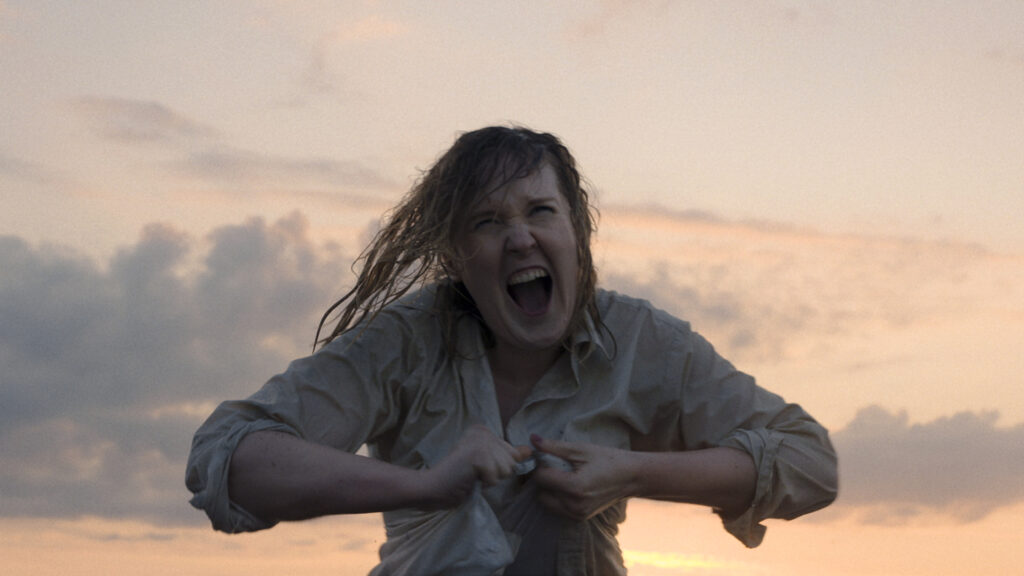
And yet the idea of an arthouse comedy is still difficult for some to grasp.
It will be interesting to see how Venice reacts to the film! I think this interest arose already during my first years in film school. Comedy was always a part of me, but there was some kind of stigma surrounding it. I thought: “I am in a real art school now, so I should probably be more serious.” It seemed that I would just look stupid if I ever try to be funny, which was of course not the case at all.
For If I Fall, which is essentially not a comedy, people were reading the script this way and I suffered because of that. I know that now, I can be perceived as “oh, she makes funny stuff”. It troubles me sometimes, but after making a couple of very serious short films I realised that for me, humour is a survival tool. The more difficult times I have in my life, the more important it becomes.
I have more confidence now, because my tutors at Biennale College were really supportive – also of the comedy side of it all. With Thick Lashes, when I was at the Torino Film Lab, it was the same. They were encouraging, even though it’s quite rare.
I would say that Biennale College is an equivalent to three, four years in a film school. The first weeks of the workshop were very intense, with 20 different tutors giving us feedback. But when you are in this kind of situation, there will be always someone who gets you. And later, you can just keep on talking. It wasn’t about some financier telling you what they think, assuming the position of the spectator. Which, by the way, is never really helpful, especially when you are almost locking your picture!
This interview is for the Finnish Film Foundation, but they could also learn from Biennale when it comes to giving feedback, I guess. It shouldn’t be about saying what you think about the film. Here, it was about discussing it as a team.
I have been dealing with female sexuality in more or less all of my films but sometimes, during these talks, you can just sense it’s a difficult topic for many people. It’s the core of your film and yet it can’t be discussed in the room. Even here, some of the tutors were twitching in their chairs! But they didn’t get scared. I am quite fine about sharing my issues, whatever they are and however painful they are. In the Finnish cinema, or European cinema, we should finesse these pedagogical tools. That’s how these stories get to be told.
Isn’t it strange that people are still so squeamish about female sexuality? Especially given that so many films seem to be starting with a rape, and nobody has a problem with that?
In my experience, for a prospective funder, or whoever is giving the feedback, it starts to feel too personal. So people’s reaction is as follows: “Let’s be professional, this isn’t some therapy session.”
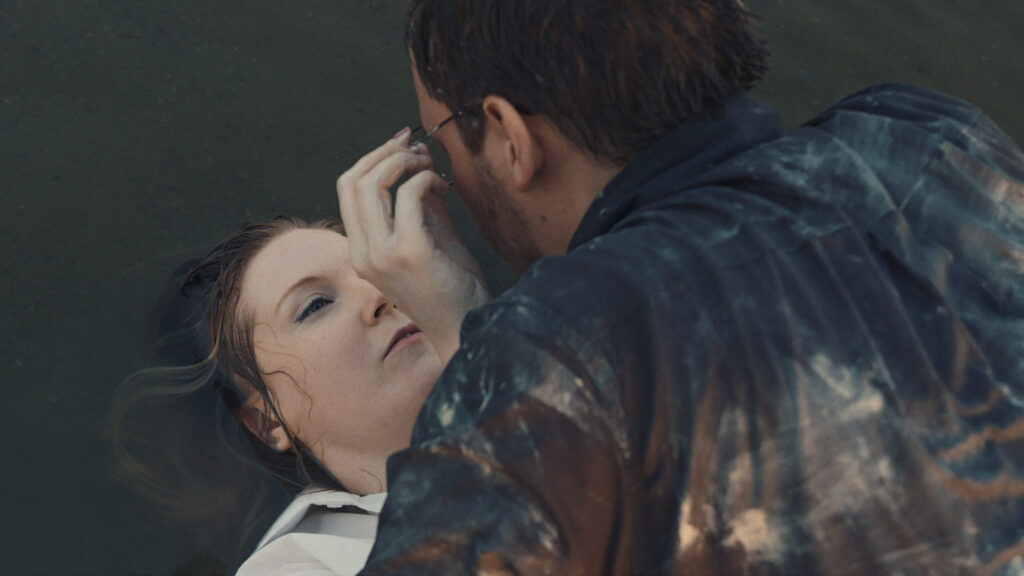
When someone is interested in pursuing the personal, or when there is even a slight suggestion that the story is based on real events, people ask about your life.
We have been talking about it with my producer: about how to deal with the upcoming interviews. It would be a very tempting path to take, but for me it’s quite straightforward: this personal aspect is already there, framed in these 103 minutes of the film.
David Lynch said it very well: it’s the film that is talking and it’s weird that after it’s done, everybody wants to talk to you as a director. [“The film is the thing. You work so hard, after the ideas come, to get this thing built […] and the second it’s finished, people want you to change it back into words.”] I am not scared of giving interviews; I want to help the spectator watch it. But the film’s job is to be a film.
Let’s take the bunny rabbit in Fucking with Nobody. It’s an accident – it just jumped from the bushes while the camera was rolling. But of course it was a way to flirt with my previous films as well, as rabbits show up also in [short] Whispering in a Friend’s Mouth for example. Anna Kuusamo, who now plays Shirley, was in that film. Just like many other actors, who have all showed up in my other works. Not to mention Tanja!
In a way, Fucking with Nobody brings together all these previous films. And I hope that in a way, it’s also a bit of a closure. If my filmmaking could be described as books, I would now say: “The first part is done. I am ready to go to the shop and buy a new one.”
Fucking with Nobody has its world premiere today, on Sep 7th, at the 77th Venice International Film Festival.
See screening times
Images: Aamu Film Company / Emilia Haukka (2nd image from the top), Jan-Niclas Jansson (all other images)
